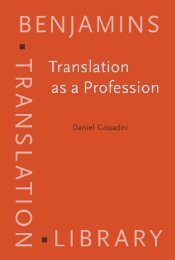Constructing a Sociology of Translation.pdf
Constructing a Sociology of Translation.pdf
Constructing a Sociology of Translation.pdf
- No tags were found...
Create successful ePaper yourself
Turn your PDF publications into a flip-book with our unique Google optimized e-Paper software.
<strong>Constructing</strong> the pr<strong>of</strong>essional field <strong>of</strong> translation 9bible translators St. Jerome and Luther and also by literary translators whosecreations have become an integral part <strong>of</strong> national literary canons. Today, thishabitus may survive amongst the interpreters and translators <strong>of</strong> transnational andinternational organisations such as the UNO or the EU. However, not all seemto be aware that they have the power to act as mediators in delicate negotiationsand to create concepts, meaning worlds and value communities (cf. Koskinen2000 :87f.).The habitus <strong>of</strong> the pariah is the most extreme version <strong>of</strong> the habitus <strong>of</strong> the“quintessential servant”, as Simeoni (1998 :12) puts it. This habitus is the relic <strong>of</strong>the historic marginalisation <strong>of</strong> translators and the result <strong>of</strong> their other or self-imposedinvisibility. Translators who adopt this habitus consider the author and poetas their master, the customer as the king. They continue to work for ever lowerprices and rates and are both the victims and originators <strong>of</strong> the current price-cuttingspiral (cf. Prunč 2003) which threatens not only their own existence but alsothe reputation <strong>of</strong> the translation pr<strong>of</strong>ession. The pariah habitus is so engrainedin their character that they ignore the fact that interpreters and translators “mayand do find themselves in the middle <strong>of</strong> potentially conflicting agendas” (Inghilleri2003 :255) and that they are involved in the power game <strong>of</strong> interpretation,whether they like it or not.The power game over interpretationA look at the history <strong>of</strong> translation as the production <strong>of</strong> text and meaning worldsquickly reveals that the dispute over whether “literal” or “free” translation is moreappropriate, largely reflects the social debate over the power and impotence <strong>of</strong>the translators, which in turn reflects the power games between all those socialforces that have a vested interest in or even a monopoly over the interpretation<strong>of</strong> a text.Ancient Greek has no special term for translation. The verb hermeneun canbe translated as “to explain”, “to interpret” or “to translate” and only the cotextwill disambiguate its meaning. <strong>Translation</strong> and (hermeneutic) interpretation arequasi-synonymous terms.<strong>Translation</strong> for the Latin authors-poets like Cicero and Horace not only meantintegrating the concepts and textual structures <strong>of</strong> the ancient Greek texts intothe Latin texts, thus providing a cultural power-base for the expanding RomanEmpire. It also meant that they interpreted the texts and adapted them throughemendatio to the target culture system. They did not doubt that they had the rightto interpret and adapt the original texts. They wielded absolute power and hadno rivals with sufficient cultural capital to vie with them for their exclusive right
















